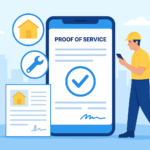Field service businesses face numerous challenges in managing their operations efficiently. From scheduling appointments to dispatching technicians, every aspect of their daily operations requires careful coordination and management. However, the biggest pain point for field service businesses is undoubtedly job costing and payroll. This is where job costing software and employee task tracking apps come in handy.
They usually have operations managers, billing managers, and payroll managers who manage each aspect of their business. Many of the tasks they perform are complex and manual, making them time-consuming and error-prone, and just difficult to manage. It only ends up hurting the business in the long run.
In order to run a profitable business, it’s crucial to accurately track the costs associated with each job and employee. This includes tracking the time spent on each task, the materials used, and any other expenses related to the job. Without proper job costing and payroll management, businesses risk overpaying employees, undercharging customers, and ultimately, losing money.
Fortunately, job cost tracking apps and employee hour tracking apps with job functionality can make it easier for field service businesses to manage these tasks. These apps allow businesses to track time, expenses, and mileage on a per-job basis, ensuring accurate job costing and payroll management. In this blog post, we will dive deeper into the benefits of using job costing and payroll management apps and highlight some of the best options available for field service businesses.
Job Costing: The Other Challenges in Field Service Management
Field service businesses face several pain points around job costing and payroll management. Here are some of the most significant challenges:
Manual Data Entry: Many field service businesses still rely on manual data entry to track job costs and employee hours. This process is time-consuming and prone to errors, which can lead to inaccurate job costing and payroll calculations.
Lack of Visibility: Without a centralized system to track employees while on the job and accurately compute employee hours, businesses may lack visibility into how much time and money is being spent on each job. This can make it difficult to identify areas where costs can be reduced or where productivity can be improved.
Inefficient Processes: Inefficient job costing and payroll management processes can result in wasted time and resources. This can include tasks like double data entry, paper-based time tracking, and manual calculations.
Overpaying Employees: Without accurate time tracking, businesses may overpay employees for hours not actually worked. This can be a significant cost for field service businesses, which rely on hourly workers to complete jobs.
Inaccurate Job Costing: Inaccurate job costing can lead to undercharging customers, which can result in lost revenue. On the other hand, overcharging customers can lead to a loss of business and a damaged reputation.
Thus, field service businesses face several challenges when it comes to job costing and payroll management. These challenges can impact profitability, productivity, and customer satisfaction. However, by using job costing software and employee task tracking apps, businesses can overcome these pain points and manage their operations more efficiently.
Job Costing: Benefits of Using Time Tracking Apps
Using time tracking apps that can help in job costing and payroll management can provide numerous benefits for field service businesses. Here are some of the top advantages:
Accurate Job Costing: The app allows businesses to track the time, materials, and expenses associated with each job. This helps businesses accurately calculate the total cost of a job, which is crucial for setting prices and maintaining profitability.
Improved Payroll Management: Employee hour tracking apps with job functionality make it easier for businesses to track employee hours and ensure accurate payroll management. These apps help businesses to pay their employees accurately.
Time Savings: Apps can help automate many time-consuming tasks, such as manual data entry and payroll calculations. This can save businesses valuable time and resources that can be used to focus on other aspects of their operations.
Better Decision Making: Accurate job costing and payroll data provide valuable insights that can help businesses make better decisions. For example, businesses can use this data to identify which jobs are the most profitable, which employees are the most productive, and which expenses can be reduced.
Increased Customer Satisfaction: Accurate job costing and payroll management can help businesses provide better service to their customers. By accurately tracking costs and hours, businesses can ensure they are delivering high-quality work at a fair price.
Overall, using job costing and payroll management apps can provide significant benefits for field service businesses. By automating time-consuming tasks, improving accuracy, and providing valuable insights, these apps can help businesses increase profitability and provide better service to their customers.
How Field Service Software Can Help Businesses With Job Costing?
allGeo is an all-in-one field service management platform that can help field service businesses overcome many of the challenges associated with job costing and payroll management. Here’s how:
Automated Time Tracking: allGeo’s employee task tracking app allows businesses to track employee hours automatically, reducing the risk of overpaying employees or making errors during manual data entry.
Geofencing: allGeo’s geofencing technology allows businesses to set up virtual perimeters around job sites, which can trigger automatic time tracking and provide real-time location data. This can help businesses ensure that employees are working at the right job site and track employee hours more accurately.
Accurate Job Costing: allGeo’s job costing software provides a centralized system for tracking time, mileage, and expenses associated with each job. This allows businesses to accurately calculate the total cost of a job and set prices accordingly.
Streamlined Processes: With allGeo, businesses can streamline job costing and payroll management processes, reducing the time and resources needed to manage these tasks. This includes features such as paperless time tracking, automated payroll calculations, mileage tracking, geofencing and real-time job costing data.
Improved Visibility: allGeo provides businesses with real-time visibility into job costs and employee hours. This allows businesses to identify areas where costs can be reduced or productivity can be improved.
Enhanced Decision Making: With accurate job costing and payroll data, businesses can make better decisions about pricing, staffing, and resource allocation. This can help businesses improve profitability and customer satisfaction.
Thus, allGeo can help field service businesses overcome many of the challenges associated with job costing and payroll management. By providing automated time tracking, accurate job costing, streamlined processes, improved visibility, and enhanced decision making, allGeo can help businesses manage their operations more efficiently and effectively.
Job Costing Use Case: allGeo Customer Story
This story about one of our customers could sound familiar to many of us. The company had a complex billing process that involved many manual steps due to custom job costing rules that were error-prone and time-consuming to calculate. They also found it challenging to track employee hours at various job sites well enough to generate accurate payroll reports. They felt that even if 60% of their payroll process could be automated, it would make a big difference. It was mission-critical for their business to put in place a formalized and streamlined payroll process as well as a job cost-tracking process for billing clients. The HR department needed to find some solution that would remove human errors in payroll calculations while reducing their overall time from activity logs to payroll.
To address a situation like this complex, a systematic approach is needed that addresses all the complicated, intricate issues involved in this workflow. The first part of this workflow is for operations to be able to clearly monitor employees as they go about their work day. We need to separately capture the time tracking and the task tracking accurately. Time tracking will provide the hours worked as employees check in and out of job sites while task tracking will capture the exact time spent on various tasks including equipment used. And while time-tracking data is sent to payroll, the task-tracking data goes to the billing/accounting department to bill clients based on the jobs that were done specifically for them.
The name of the game is to automate time tracking and task tracking. Collecting time and task data is no trivial task. Businesses doing it manually simply cannot get accurate information and they usually come up with manual estimates. The right technology can make all the difference. Automating time tracking requires technologies like Geofencing to be able to know when a field employee arrives and leaves a job site making check-in and check-out automatic, requiring no manual input from the employee. Task tracking can be done with Geofencing and QR codes that can be scanned by the employee when using specific equipment or doing certain tasks. Automated capture of both time and tasks is critical to set us up for the next part of how we go about doing the billing and payroll.
Companies also use task tracking to understand how employees are performing in the field, especially how much time they are spending on different types of jobs and how many jobs they are doing per day. These are critical KPIs that many operations teams track and measure against benchmarks. One of our customers who had over 750 property inspectors in the field was able to boost each employee’s productivity by 30 to 40 minutes per day, the equivalent of hiring over 60 new employees.
Larger companies usually have different types of employees whose pay rates are very different. This information along with the time clocking hours are sent to payroll for processing. But how should this be done? If sent in an XL spreadsheet, then payroll has to import it into their payroll system before they can work on it. Again, this is where technology in the form of API Integration enables this data to be sent directly to a payroll system like ADP for example. The names of the employees, their pay rates, their hours, their mileage, etc is captured and automatically uploaded into the payroll system making it easier for the payroll department to carry out their process quickly and efficiently.
Task tracking on the other hand has job codes with different rates associated with the jobs and tasks. Companies use rules to perform calculations and then send the data off to a billing system like Quickbooks. Again, through API integration, the data is directly synced into the billing system as opposed to a manual process that can be extremely complex. For example, a typical day for an employee may involve a QR scan at machine 1, job 1 followed by a QR code at machine 2, job 2, and then a break. After the break, the employee does a QR scan at job 2 followed by job 4. Then scans the QR code for job 1 again. If all job 1 tasks are for client A, a smart system would be able to perform job costing by keeping track of all the costs involved with the appropriate rates for machines, equipment, and so on.
As we have walked through all the nuances of this workflow, we can see that a good job costing and payroll solution needs a lot of different pieces and technology to fall in place. What is reassuring is that the same set of technologies and tools – Geofencing, QR codes, Mobile forms, with Employee & Customer profiles in sync with the company’s accounting platform can be used to generate payroll reports and job costing reports with custom pay rate logic. In addition, API integration enables time clock data to go to payroll systems (ADP, Paycom, Paycor, etc) and job cost tracking data goes to accounting systems such as Quickbooks and ERP/analytics systems such as Dynamics, Google Sheets or MS 365 Excel to optimize operations.
At allGeo, we work with field service businesses that face these issues on a daily basis. With a platform that can address both time & task tracking and integrates with payroll and billing systems, field service businesses can get to a better place where job cost tracking and payroll will no longer be their biggest concern. They can finally focus on growing their business.
Conclusion
Job costing and payroll management can be a significant challenge for field service businesses. However, with the right tools and processes in place, businesses can overcome these challenges and manage their operations more efficiently and effectively.
allGeo’s all-in-one field service management platform offers a comprehensive solution to these challenges. By leveraging software capabilities, field service businesses can reduce costs, improve productivity, and enhance customer satisfaction, ultimately leading to greater success and profitability.
So if you’re a field service business struggling with job costing and payroll management, consider implementing allGeo’s job costing software, to take your business to the next level.
About allGeo
Abaqus, based in Silicon Valley, CA, is a leading provider of cloud-hosted, low-code / low-IT field service automation platform that helps midsize and Enterprise businesses achieve field service excellence. The allGeo platform helps businesses customize and automate their field service workflows to better manage and optimize their operations, field employees & assets. With allGeo, Field service businesses can significantly reduce payroll and operations costs while improving productivity and accountability. The allGeo platform hosts a suite of turnkey apps that can be rapidly deployed in a wide range of industries e.g. Scheduling, Time Clock, Tracking & Monitoring, Mileage, Dispatch, Electronic Visit Verification, Lone Worker Safety, and Field Inspection using QR / mobile forms. Visit www.allgeo.com for more information.



